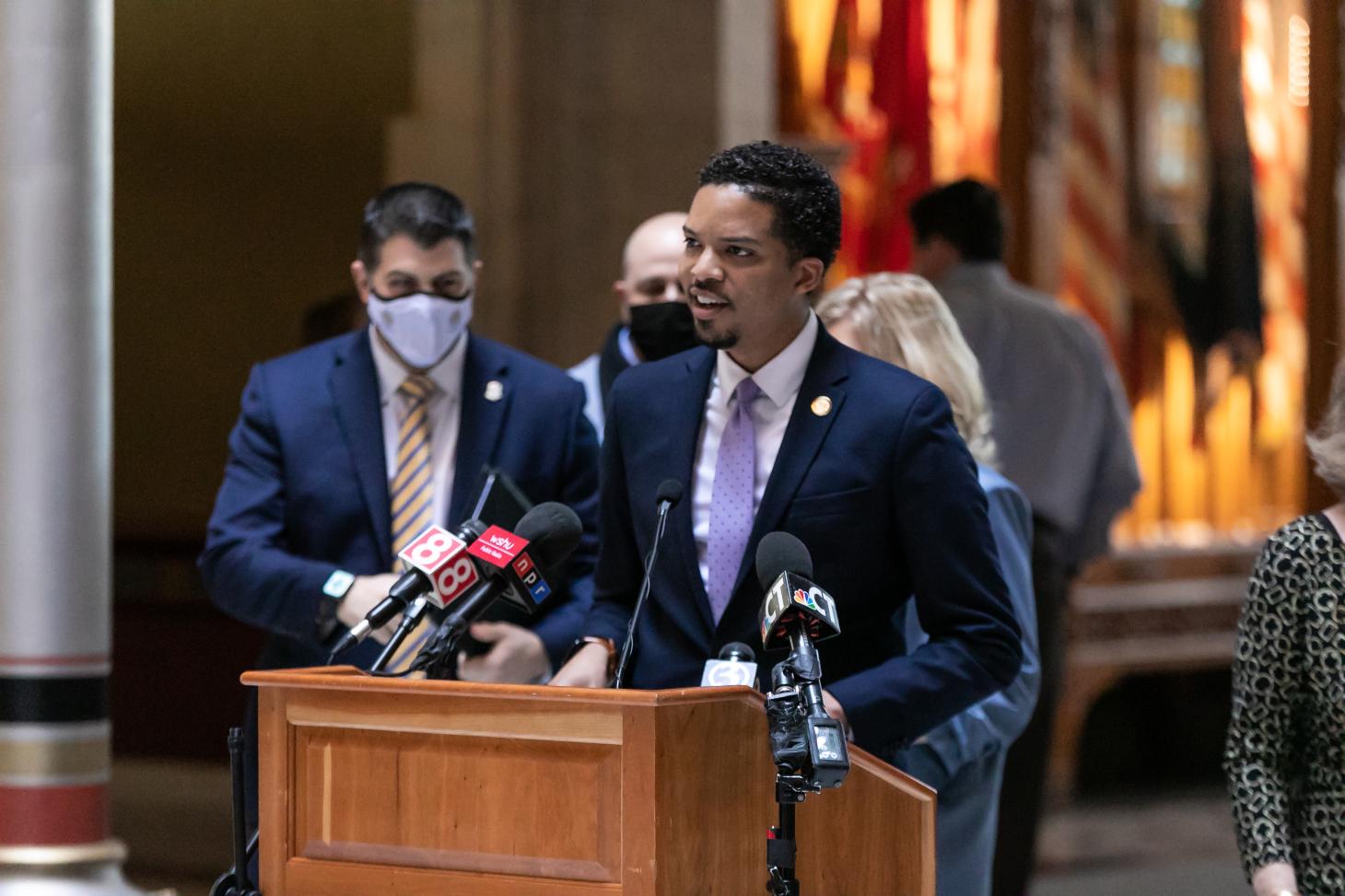Reps. Paris, Palm, Turco, Kavros DeGraw, M. Sanchez Announce SB 250 to Tackle CT's Student Loan Debt

State Representatives Corey P. Paris (D – Stamford), Gary Turco (D – Newington), Christine Palm (D – Chester, Deep River, Essex, Haddam), Eleni Kavros DeGraw (D – Avon, Canton), and Manny Sanchez (D – New Britain, Newington) held a press conference Tuesday announcing legislation to help address Connecticut's student loan debt crisis. The press conference coincides with the Higher Education & Employment Advancement Committee's public hearing on the proposed bill.
According to data from the Federal Reserve Bank of New York for the end of 2021, 542,300 Connecticut student loan borrowers have about $19.7 billion in student debt. For the Class of 2020, Connecticut borrowers had the fifth-highest average student loan debt in the country. The average debt was $35,853, according to data from the Institute for College Access & Success.
The proposed bill creates a student loan reimbursement program for Connecticut residents who attended a Connecticut state college or university. The program would pay $5,000 of a participating borrower's loan each year they are in the program for up to 5 years for a total of $25,000. Payments would be made directly to the Connecticut Higher Education Supplemental Loan Authority (CHESLA) for loan forgiveness. Borrowers must meet eligibility requirements including residing in Connecticut for five consecutive years, working for at least two years, and completing 100 hours of volunteer service annually, among others.
"Like most college graduates across the country, student loan debt has anchored many Connecticut borrowers. The financial burden of student loans is amplified by the rising cost of living, stagnant wages, and a tougher job market despite a recovering economy," said Rep. Paris. "Far too often, this debt can follow borrowers for years, sometimes decades, pushing individuals to postpone life plans. This proposal works to ease that debt burden so families and residents can move forward."
“Connecticut’s economic future depends on its highly talented and educated young people, many of whom are saddled with crippling student loan debt,” said Rep. Turco, also vice chair of the Higher Education & Employment Advancement Committee. “An earned student loan debt assistance program, which requires volunteering for a nonprofit and remaining a working, tax-paying resident of Connecticut, provides an incentive for young people to lay down roots and secures the workforce our state needs to thrive.”
"Exorbitant student loan debt is not about young people's values or habits -- it's about math," said Rep. Palm. "It's the math that doesn't add up to a prosperous -- or even financially secure -- future for young people. Take inflation as only one measure: Since the precursor to Pell Grants were introduced in the late 1960s, average college tuition has risen 6.7 percent, per year, while the average cost of living increases, on average, 3.4 percent annually. So, college costs rise at a rate at least twice that of other goods and services. Meanwhile, wages have stagnated, so much so, that the federal minimum wage, in real, adjusted dollars, has less buying power than it had in the 1970s. This is unsupportable math. This is where government needs to step in."
“Affording college and what the debt from college may be after graduation is a significant concern for constituents across Connecticut," said Rep. Kavros DeGraw, also vice chair of the Finance, Revenue & Bonding Committee. "This bill will alleviate some of the financial stress of the people who not only chose Connecticut for a great education but chose to stay in Connecticut as they started their careers. Additionally, the service piece of the bill connects people to their communities and to building the Connecticut of tomorrow."
"Pursuing a higher education shouldn't mean a lifetime of crippling debt that hampers graduates from contributing to the economy," Rep. Manny Sanchez said. "This program will serve to bolster economic activity and will benefit not only degree holders, but the state as a whole. I look forward to working with my colleagues to advance this important legislation.”
The proposal works to ease the financial burden of student loan debt and stem the "brain drain" of college-educated individuals of prime working age who leave Connecticut for more lucrative work and a more affordable cost of living. In the United States, student loan debt ballooned by 144 percent from 2007 to 2020. Rising federal and private loan borrowing rates can be attributed in part to reduced state support for state financial aid programs, tuition and fee hikes, poor accountability for low-performing institutions, among other factors. The cost burden of student debt can impact borrowers' ability to build wealth, contribute to their families, and engage with their community.
Student loan debt relief is a matter of economic and racial justice as student debt has the most impact on low-income borrowers, first-generation borrowers, and borrowers of color. Nationally, Black and Hispanic students are more likely than other racial groups to borrow student loans. In 2016, 86 percent of Black and 70 percent of Hispanic bachelor's degree recipients took out student loans compared to 68 percent of white and 44 percent of Asian graduates. Black students not only take out student loans at a higher rate – they typically borrow more, owe more than they borrowed, and are three times as likely to default on their student loans. Defaulting on student loans has severe consequences including garnished wages, withheld tax refunds, acceleration of the loan's unpaid balance, damage to the borrower's credit rating, and more.





